With the franchise tag application deadline in the rearview mirror, we have a clearer picture of who will be available in free agency. Barring 11th-hour deals, starting quarterbacks and a future Hall of Fame defensive tackle will drive the class in the 32nd year of full-fledged free agency in the NFL.
In addition to the Kirk Cousins–Baker Mayfield–Chris Jones trio, interior offensive linemen will cash in as part of this year’s crop. Last year’s tackle class was a bit deeper; this year, O-line dollars figure to be funneled inside.
The NFL’s legal tampering period, which gives players a window to speak with other teams and reach unofficial agreements, begins at 11am CT on March 11. The new league year opens two days later, though much of the frenzy will take place during the tampering period.
This list ranks free agents by earning potential, with guaranteed money serving as the general measuring stick. This is one of the great running back classes in free agency annals, but even though some of the RBs’ accomplishments far eclipse many of the players ranked above them, the position’s market has absorbed numerous hits. Older standouts, including potential Hall of Famers, not having the earning power they once did also factors into this equation.
Here is this year’s PFR top 50 free agents list, along with potential landing spots for each player.
1. Kirk Cousins, QB. Age in Week 1: 36
Cousins hitting free agency in his prime six years ago brought countless rumors about his value and future. Quarterback movement was less common then. Cousins made that foray count, scoring a landmark deal from the Vikings – a fully guaranteed three-year, $84MM pact. We are back here again because Cousins and the Vikings could not agree on a fourth extension, with the sides’ 2023 talks breaking down in part because Minnesota refused to provide guarantees into a third year. Cousins is coming off an Achilles tear, but given the need here, the 13th-year veteran is back atop a free agent value list.
Thanks to Cousins’ two-franchise tag path out of Washington in the late 2010s, the Vikings could not realistically tag their quarterback. No one has been tagged a third time since the 2006 CBA made doing so prohibitive. While the Vikings and Cousins have each expressed interest in a reunion, time is running out due to the structure of Cousins’ third Vikings contract. And a clear threat has emerged.
 If Minnesota cannot re-sign Cousins before the start of the 2024 league year, $28.5MM in dead money will move onto the team’s 2024 cap sheet. Considering the dead cap awaiting and the Vikings holding the No. 11 overall draft slot, the team is in crunch time at quarterback. Minnesota will need to decide on perhaps one final contract with one of the NFL’s all-time financial mavens, and with Justin Jefferson interested in the team’s decision with the quarterback that helped him to a historic start, the NFC North club is navigating a layered process.
If Minnesota cannot re-sign Cousins before the start of the 2024 league year, $28.5MM in dead money will move onto the team’s 2024 cap sheet. Considering the dead cap awaiting and the Vikings holding the No. 11 overall draft slot, the team is in crunch time at quarterback. Minnesota will need to decide on perhaps one final contract with one of the NFL’s all-time financial mavens, and with Justin Jefferson interested in the team’s decision with the quarterback that helped him to a historic start, the NFC North club is navigating a layered process.
Never confused with a top-tier quarterback, Cousins has been in the league’s upper third for much of his career. The former Washington fourth-rounder had thrown 18 TD passes compared to five INTs before the Week 8 Achilles tear shut him down, finishing this productive stretch with Jefferson sidelined three games. QBR slotted Cousins seventh last season but rehabbing this injury in his mid-30s certainly will not make teams feel great about the offers required to win this derby. Still, this is the cost of doing business with above-average QBs.
Cousins has all of one Pro Bowl as a non-alternate, coming in 2022. Illustrating the value this position brings and Cousins having the upper hand on the Vikings in negotiations thanks to the fully guaranteed deal he landed in 2018, the Michigan State alum has made more than $231MM in his career. That number will almost definitely balloon past $300MM by 2025. Cousins has signed deals worth $28MM, $33MM and $35MM per year. Although Derek Carr scored a $37.5MM-AAV Saints pact and a practical guarantee of $70MM, Cousins’ consistency and financial shrewdness may still top that even near the end of his mid-30s.
Only Fran Tarkenton and Tommy Kramer have served as Vikings QB1s longer than Cousins, but Minnesota also must begin planning for the future. The team has seen Cousins and Jefferson form a dominant connection; Minnesota has also won just one playoff game since signing Cousins, failing to reach the postseason in three of his healthy years. If the Vikings pass and set their sights on the draft, who will make the payment?
Facing incomprehensible dead money due to the Russell Wilson extension going bust, the Broncos could certainly use Cousins as a bridge. Denver’s dead cap — $85MM over the next two years once Wilson is designated a post-June 1 cut — will make this signing difficult. The Broncos bowed out of the Cousins sweepstakes six years ago, signing Case Keenum; they may not have the resources to make a competitive bid now.
Cousins-to-Atlanta is producing enough smoke it is time to closely monitor this relocation; this reality would put Terry Fontenot’s skill-position draftees in better position to thrive, after Marcus Mariota and Desmond Ridder held them back. While Justin Fields odds pointed the Bears QB to Atlanta last week, it looks like the Falcons prefer a proving passing option. Hiring ex-Rams QBs coach Zac Robinson as OC, the Falcons appear the Vikings’ top threat if Cousins hits the tampering period unsigned.
Best fits: Falcons, Vikings, Broncos
2. Baker Mayfield, QB. Age in Week 1: 29
Were this an accomplishments-based ranking, Mayfield would not sniff this tier. Starting QBs in their primes get paid, as they rarely reach the market. Mayfield is not exactly a set-it-and-forget-it option, as this era has featured less QB patience than previous NFL periods. But he is being linked in the $35MM-per-year range. That marks a staggering transformation from 2023, when one team was willing to make the former No. 1 pick its starter favorite.
Mayfield turned down slightly more lucrative offers to vie against only Kyle Trask — after the Bucs passed on Will Levis, whom they brought in for a “30” visit — last year. The bet on a return to form in Dave Canales’ system paid off, though it is important to note how far the ex-Browns QB1 fell over the previous two seasons. Rumblings of a franchise-level extension — in the $30MM-plus-AAV range, when that number meant more — surrounded Mayfield’s 2021 offseason, which followed the ’20 Browns nearly upsetting the Chiefs in the divisional round. That remains Cleveland’s lone Round 2 playoff run since 1989. Had Mayfield built on the progress he showed in 2020, an alternate NFL reality — in which the Falcons have Deshaun Watson and the Bucs pursue a different post-Tom Brady stopgap — probably ensues. But the ’21 season tanked Mayfield’s stock, which had farther to fall in 2022.
 An early-season injury to Mayfield’s non-throwing shoulder plagued him in 2021, and after the Browns’ unrefusable Watson offer led Mayfield to Carolina, horrid form keyed a last-place QBR finish in 2022. Mayfield’s 2023 QBR (54.3) trails his 2020 number (65.5), and the Bucs went from 3-0 to 4-7 to the divisional round. This rollercoaster ride provided a nice microcosm of Mayfield’s pro career, which also involved a steep 2019 dip due largely to Freddie Kitchens being overmatched as a head coach. But the inconsistency should matter here, to a degree.
An early-season injury to Mayfield’s non-throwing shoulder plagued him in 2021, and after the Browns’ unrefusable Watson offer led Mayfield to Carolina, horrid form keyed a last-place QBR finish in 2022. Mayfield’s 2023 QBR (54.3) trails his 2020 number (65.5), and the Bucs went from 3-0 to 4-7 to the divisional round. This rollercoaster ride provided a nice microcosm of Mayfield’s pro career, which also involved a steep 2019 dip due largely to Freddie Kitchens being overmatched as a head coach. But the inconsistency should matter here, to a degree.
If the Bucs let Mayfield hit the market, the statuses of Cousins and Justin Fields will be intertwined with his as teams without top-three draft real estate determine their options. It is not out of the question clubs could view Sam Darnold, Jacoby Brissett, Gardner Minshew or Ryan Tannehill at a far lower price as a more cost-effective option than Mayfield. The Giants faced same question last year; was there a team willing to go to the $40MM-per-year place had Big Blue let Daniel Jones hit free agency? The Jones contract has likely come up in Mayfield negotiations, complicating the Bucs’ decision.
Mayfield established new career-high marks in TD passes (28) and yards (4,044). He also limited his INTs to 10 in Canales’ offense. The Bucs gave Mayfield input in their OC search, which produced ex-Rams OC Liam Coen, providing an obvious signal they do not intend to let him get away. The Bucs just made the playoffs with Brady’s $35.1MM void years-driven dead money on their payroll. While Mayfield’s deal would be backloaded, Tampa Bay would not see too much change here with Mayfield set to go from a $4MM base salary to likely beyond $30MM.
Geno Smith’s three-year, $75MM deal should serve as Mayfield’s floor, as it is the veteran-QB1 basement presently. But Smith agreed to Seahawks-friendly terms. A pay-as-you-go contract is unlikely here, with the Jones and Derek Carr deals respectively producing practical guarantees of $81MM and $70MM. Mayfield is also four years younger than Smith. Mayfield might not match Jones and Carr for AAV, but the Bucs will need to pay him more per year than they did Brady ($25MM).
Passing would make the Bucs start over from a poor draft slot to do so (No. 25), arming Mayfield’s camp with more leverage. The Vikings being unable to complete a deal with Cousins could make them a Mayfield suitor, and while the Patriots have quite a few connections to the former Heisman winner — including Eliot Wolf and OC Alex Van Pelt — it does not make too much sense for the Pats taking this route given the shape of their roster. With Fields and Cousins in the mix and the Steelers setting their sights lower, Mayfield’s options are still somewhat limited. That will play into the Bucs’ hands; both sides need to be careful here.
Best fits: Buccaneers, Falcons, Vikings
3. Chris Jones, IDL. Age in Week 1: 30
The Chiefs secured dynasty status after trading Tyreek Hill and, barring some playoff surges, missing on the Frank Clark contract. They have not paid cornerbacks during this stretch, highlighting the importance of Steve Spagnuolo’s centerpiece defender. (L’Jarius Sneed’s franchise tag, coming with heavy trade rumors, points to the Chiefs going in this direction again.) Patrick Mahomes and, especially over the past year, Travis Kelce receive most of the attention. Jones has been the clear third Chiefs pillar during this period, racking up five All-Pro honors and being the only pure defensive tackle in the sack era (1982-present) to record two 15-sack seasons.
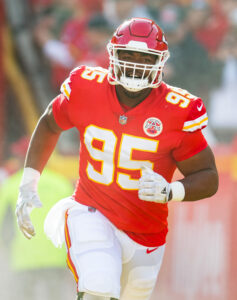 Jones has also been durable, missing more than two games in a season just twice and suiting up for all but one contest during Kansas City’s back-to-back Super Bowl-winning campaigns. That makes the Chiefs’ defensive struggles in Week 1, during Jones’ holdout, notable. Rightfully asking for money in the Aaron Donald neighborhood, Jones bet on himself rather than accept a Chiefs offer that placed him on the same plane as less proven DTs — in the second tier that formed thanks to 2023’s Jeffery Simmons, Quinnen Williams, Daron Payne and Dexter Lawrence extensions. With Nick Bosa raising the defender ceiling to $34MM per year in September, Jones reaching $30MM AAV is in play on the open market. The Chiefs’ top priority is preventing Jones reaching free agency.
Jones has also been durable, missing more than two games in a season just twice and suiting up for all but one contest during Kansas City’s back-to-back Super Bowl-winning campaigns. That makes the Chiefs’ defensive struggles in Week 1, during Jones’ holdout, notable. Rightfully asking for money in the Aaron Donald neighborhood, Jones bet on himself rather than accept a Chiefs offer that placed him on the same plane as less proven DTs — in the second tier that formed thanks to 2023’s Jeffery Simmons, Quinnen Williams, Daron Payne and Dexter Lawrence extensions. With Nick Bosa raising the defender ceiling to $34MM per year in September, Jones reaching $30MM AAV is in play on the open market. The Chiefs’ top priority is preventing Jones reaching free agency.
Kansas City franchise-tagged Jones in 2020, which always made a 2024 tag – at 120% of his pre-restructure 2023 salary, pushing the total past $32MM — unrealistic. Although Jones has said on multiple occasions he wants to stay in Missouri, the Chiefs’ negotiations last year created the risk of losing one of the best players in franchise history. From a pass-rushing standpoint, Jones has surpassed Donald (the current Donald version, that is) during the Chiefs’ back-to-back Super Bowl-winning years. He is three years younger than the Rams all-time great. Donald needed to threaten retirement to secure his landmark raise at 31; Jones reaching the open market healthy — in a year when a record cap spike occurred — effectively maximizes his leverage.
Javon Hargrave scored a $21MM-per-year pact; it took only $40MM fully guaranteed for the 49ers to land him. From an accomplishments and impact standpoint, Jones’ free agency is closer to Reggie White’s than Hargrave. White was 31 when his 1993 free agency tour commenced. Albert Haynesworth (2009) and Ndamukong Suh (2015) scored record-setting deals when they hit the market. Jones probably will not top Bosa’s AAV, but eclipsing the current DT guarantee high (Williams’ $66MM) seems likely.
The Chiefs have shown they can get by after losing corners; they have not shown they can win without Jones, who has made countless pivotal plays while rushing from inside and outside. The most recent led to a 49ers overtime field goal, which set up a championship-cementing Chiefs drive. Kansas City will need to make a monster offer to keep Jones off the market, but at this point, the champs must prepare to outbid other teams as their future Hall of Fame DT is less than a week away from testing the market.
Bears GM Ryan Poles was in Kansas City when the Chiefs drafted Jones in the 2016 second round, and Chicago is likely to restart its QB contract clock via a Caleb Williams pick soon. The Texans also have a rookie-QB contract (and Will Anderson on a rookie pact) around which Jones’ guaranteed years could be structured. With budgets increasing as of the recent cap news, teams could enter this bidding for one of the best defenders to ever hit free agency.
Best fits: Chiefs, Texans, Bears
4. Christian Wilkins, IDL. Age in Week 1: 28
The stars have aligned for Wilkins. From the Dolphins’ cap status to Justin Madubuike being franchise-tagged and the rest of the high-level D-tackles from Wilkins’ draft class being extended last year, the charismatic Clemson alum is about to reap the rewards of hitting free agency at this point. Excelling against the run and coming off his best pass-rushing season, the five-year veteran is likely to land a deal in the ballpark of those given to the rest of the 2019 first-round DT contingent. If the Chiefs re-sign Chris Jones, suddenly the player the Dolphins shied away from extending is the market’s top D-tackle prize.
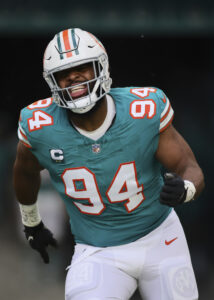 Negotiations dragged on last summer, and other deals set the market. The Commanders extended Daron Payne in March, while the Titans reached an agreement with Jeffery Simmons in April. Dexter Lawrence followed in May, and the Jets hammered out their Quinnen Williams re-up just before training camp. Each pact was worth between $22.5-$24MM per year, creating a new second tier behind Aaron Donald’s outlier accord, and brought between $46-$47.9MM guaranteed at signing. This is a narrow range, making it a bit odd nothing was finalized. The Dolphins offered a top-10 DT salary, but that falls short of the Payne-Simmons-Lawrence-Williams range. It is possible the Dolphins also used 2019 first-round DT Ed Oliver’s deal, which came in lower ($17MM AAV, $24.5MM guaranteed at signing) as a comp in these talks. That would naturally introduce a complication.
Negotiations dragged on last summer, and other deals set the market. The Commanders extended Daron Payne in March, while the Titans reached an agreement with Jeffery Simmons in April. Dexter Lawrence followed in May, and the Jets hammered out their Quinnen Williams re-up just before training camp. Each pact was worth between $22.5-$24MM per year, creating a new second tier behind Aaron Donald’s outlier accord, and brought between $46-$47.9MM guaranteed at signing. This is a narrow range, making it a bit odd nothing was finalized. The Dolphins offered a top-10 DT salary, but that falls short of the Payne-Simmons-Lawrence-Williams range. It is possible the Dolphins also used 2019 first-round DT Ed Oliver’s deal, which came in lower ($17MM AAV, $24.5MM guaranteed at signing) as a comp in these talks. That would naturally introduce a complication.
A September rumor suggested the Dolphins were hesitant to go into the above-referenced price range due to Wilkins’ low sack output (11.5 sacks from 2019-22). He responded with a career year, tallying nine sacks — twice as many as his previous best — and 23 QB hits (10 more than his prior best). Wilkins finished 13th in ESPN’s pass rush win rate metric. This came after ESPN’s run stop win rate metric viewed Wilkins as a dominant presence, ranking him first in 2022 and second in 2021. Wilkins, who also deflected 15 passes from 2020-22, adding a pass rush piece will be valuable soon.
Residing in poor cap shape, the Dolphins already released Jerome Baker and Emmanuel Ogbah and are set to cut Xavien Howard. They have also paid two D-line pieces — DE Bradley Chubb, DT Zach Sieler — eight figures per year and have Jaelan Phillips presumably on the extension radar. Will Wilkins, acquired during Brian Flores’ first year, need to find his money elsewhere? Flores’ Vikings could be wait
Best fits: Texans, Vikings, Patriots
5. Jonathan Greenard, Edge. Age in Week 1: 27
Already a lower-profile franchise, the Texans saw their on-field work drift off the radar as their Bill O’Brien-run operation cratered and produced two subsequent HC one-and-dones. One of the players who was worth monitoring during this bleak period broke through to help Houston re-emerge under DeMeco Ryans. Greenard delivered a 12.5-sack season, leading the Texans in sacks by a wide margin and providing Will Anderson with a quality bookend.
A fringe tag candidate entering the offseason, Greenard had already tallied an eight-sack season (in 2021) before an injury-plagued 2022 stalled his early-career momentum. But last season brought new territory. Ranking 20th with 33 quarterback pressures, Greenard smashed his career-high with 22 QB hits. He ranked sixth among edge rushers in ESPN’s pass rush win rate metric in 2023. Reinvigorated in Ryans’ scheme, Greenard profiles as a player the Texans want to re-sign. But rumblings about his price will put Houston to the test. An AAV in the $22MM neighborhood could be in the offing for a player whose best work should still be ahead. Teams look eager to land Greenard.
Sitting in the top five in cap space and having Anderson and C.J. Stroud tied to rookie deals through at least 2025, the Texans can afford to make some investments elsewhere. They have begun doing so via the Dalton Schultz re-signing. Beyond its O-line, Houston’s cap sheet is light on big payments. Regularly stocking the roster with two-year deals at lower-middle-class rates, GM Nick Caserio has not gone to this financial territory to retain a player just yet. The Patriots would regularly let this type of player walk, as the Trey Flowers 2019 Detroit defection illustrates. The Texans’ Stroud and Anderson situations, however, support a re-signing.
Best fits: Texans, Commanders, Bears
6. Danielle Hunter, Edge. Age in Week 1: 29
Like Mike Evans, Hunter saw his second contract surpassed by several lesser talents. Both he and Evans maintained quality form long enough to be a top free agent in search of a third accord. Evans bowed out early, re-signing with the Buccaneers. Hunter likely reaches free agency. The youngest player to hit the 50-sack mark, Hunter saw his career veer off course after 2020 (neck) and 2021 (pec) injuries limited him to just seven games in that span. Powering the Vikings’ pass rush over the past two years, Hunter has re-established his value. Despite going into Year 10, Hunter should still have some prime seasons to factor into negotiations.
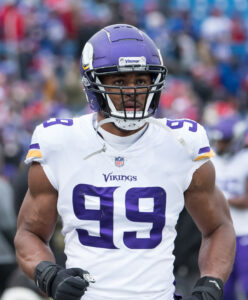 The former Mike Zimmer-era staple signed an extension (five years, $72MM) that was viewed as Vikings-friendly in the moment. It became a frequent headline-driver — to the point Hunter renegotiated it on multiple occasions and ended up on the trade block in two offseasons. His second restructure proved savvy. The August reworking prevented Minnesota from franchise-tagging its top pass rusher, creating the historically rare circumstance in which a team could not tag either of its top two free agents.
The former Mike Zimmer-era staple signed an extension (five years, $72MM) that was viewed as Vikings-friendly in the moment. It became a frequent headline-driver — to the point Hunter renegotiated it on multiple occasions and ended up on the trade block in two offseasons. His second restructure proved savvy. The August reworking prevented Minnesota from franchise-tagging its top pass rusher, creating the historically rare circumstance in which a team could not tag either of its top two free agents.
Hunter dominated in his contract year, totaling a career-high 16.5 sacks and an NFL-leading 23 tackles for loss. Disproving 2023 as a contract-year fluke, Hunter equaled his 2023 QB hit total in 2022 (22) in helping a flawed Vikings team to 13 wins. The former third-round pick also has five double-digit sack seasons and is nearly three years removed from his most recent major injury. Josh Allen and Brian Burns being tagged will turn eyes to the older sack specialist, who has undoubtedly awaited this window for a while.
It is worth noting that players with somewhat similar profiles in Hunter’s age range — Leonard Floyd, Yannick Ngakoue — went overlooked on last year’s market and settled for one-year deals. Hunter is a class above both, and teams have more money to spend this year. Hunter being set to turn 30 this fall will be an interesting market to monitor, but teams pay up for prime edges; the longtime Twin Cities resident should qualify as such for a bit longer.
The Rams have some money to burn and a need to maximize the remaining primes of Donald, Matthew Stafford and Cooper Kupp. The Commanders need to replace Montez Sweat and Chase Young, and they will likely have a rookie-QB deal to build around soon. It is also possible Washington trades Jonathan Allen, who expressed a disinterest in another rebuild. That would free up a salary slot on the cap-rich team’s D-line. The Falcons have not rostered a seven-sack player since Vic Beasley in 2019, and GM Terry Fontenot — perhaps more so after the team’s clunky Bill Belichick courtship — is on a hot seat. The Vikings have Hunter, Marcus Davenport and D.J. Wonnum unsigned; unless they want to start over, keeping Hunter as their pass-rushing centerpiece adds up.
Best fits: Rams, Vikings, Falcons
7. Calvin Ridley, WR. Age in Week 1: 29
The trade parameters with the Falcons should lead the Jaguars to let Ridley hit the market. Jacksonville already sent Atlanta a 2023 fifth-rounder, and Ridley making the Jags’ 53-man roster last year triggered at least a 2024 fourth go to the Falcons. Ridley met the conditions for a third-round pick to transfer, but if the Jags were to re-sign the veteran wideout before his contract expires March 13, they would owe the Falcons a 2024 second. While the Jaguars want to retain Ridley, they will likely opt to make their final pitch to the pass catcher once he hits free agency. Ridley will be a top beneficiary from some key developments on the receiver market. Evans re-signing and Tee Higgins and Michael Pittman Jr. being franchise-tagged puts Ridley in position as the top wideout available.
 Considering how long Ridley was out of the mix due to the mental health-related hiatus and ensuing gambling suspension, his 1,016-yard season can be viewed positively. The former Falcons first-rounder, however, delivered his production in spurts. He submitted nine games with 40 or fewer receiving yards last season, with his lack of consistency being among the issues that plagued a disappointing Jags offense. This was also only Ridley’s second 1,000-yard season. It would stand to reason that more time with Trevor Lawrence would allow a more potent connection to form.
Considering how long Ridley was out of the mix due to the mental health-related hiatus and ensuing gambling suspension, his 1,016-yard season can be viewed positively. The former Falcons first-rounder, however, delivered his production in spurts. He submitted nine games with 40 or fewer receiving yards last season, with his lack of consistency being among the issues that plagued a disappointing Jags offense. This was also only Ridley’s second 1,000-yard season. It would stand to reason that more time with Trevor Lawrence would allow a more potent connection to form.
Ridley is older than most of his 2018 draft classmates, being set to turn 30 before the 2024 season ends. The gambling suspension stalled his path to free agency and could certainly limit his payday. Teams will obviously consider Ridley’s past when preparing offers, but the tagged receivers and Evans’ re-signing will boost available pass catchers’ causes. The Jags may have a price point here, though. Jacksonville rosters an $18MM-per-year wideout (Christian Kirk) and a $13.75MM-AAV tight end (Evan Engram). Throwing in Zay Jones’ $10.75MM 2024 cap hit — should the slot cog remain in the team’s plans — and this is a veteran-heavy supporting cast for a team that will need to extend Lawrence this year or next.
Several teams, including the Browns, discussed Ridley with the Falcons in 2022. Ridley preferred the Jaguars; it will be interesting to see if the Jags’ best offer is in the ballpark of the top proposal he receives.
Best fits: Jaguars, Titans, Panthers
8. Patrick Queen, LB. Age in Week 1: 25
Last year’s market brought some concerns for the ILB position. A flood of young starters hit free agency; only two topped the $10MM-AAV mark. One of those, Bobby Okereke, came in at $10MM per year. But Queen should reside in the upper crust of ILB contracts soon. With the Ravens already authorizing the top off-ball linebacker contract (Roquan Smith’s five-year, $100MM pact), Queen has long been ticketed to leave Baltimore this offseason. Smith’s midseason arrival in 2022 also raised Queen’s stock.
Igniting down the stretch in 2022, Queen booked his first Pro Bowl honor a year later. Registering a career-high 133 tackles in Mike Macdonald’s top-ranked defense, Queen has also produced as a sporadic pass rusher. The 2020 first-round pick tallied 8.5 sacks from 2022-23. Queen has also never missed a game. The Ravens declined the LSU alum’s fifth-year option, joining the other teams that used a 2020 first-round choice on a linebacker, and a nice payday likely will come a year earlier as a result.
The Seahawks have both their three-down ‘backers (Bobby Wagner, Jordyn Brooks) hitting free agency, and Macdonald’s presence makes for a logical connection. Both players want to return, which will put the Macdonald connection to the test. Seattle also just cleared more than $35MM in cap space by cutting Jamal Adams, Quandre Diggs and Will Dissly. Pittsburgh’s linebacking setup imploded last year, leading to the team using multiple in-season pickups as starters. A Queen pursuit would go against the Steelers’ more cautious free agency M.O., as Queen’s age and experience lines up with Tremaine Edmunds — who fetched $18MM per year last March. But Pittsburgh has been more willing to spend on FAs since Ben Roethlisberger‘s contract came off the books.
Best fits: Seahawks, Titans, Steelers
9. Bryce Huff, Edge. Age in Week 1: 26
A fascinating market stands to develop here. The Jets both did not trust Huff as an every-down player and used a 2023 first-round pick on a prospect (Will McDonald) seemingly poised to replace him. But the former UDFA broke through in his contract year, leading the team with 10 sacks and topping the NFL in pressure rate (21.8%). That coming on only 480 defensive snaps — a career high that still fell outside the top 70 among edge defenders last season — creates an evaluation challenge for edge-needy clubs.
Huff, who did not eclipse four sacks in any previous season, still played himself off the “prove it” tier. The Jaguars and Panthers respectively tagging Josh Allen and Brian Burns boosts Huff’s cause, as does the cap exploding by nearly $31MM this year. This could be a buyer-beware situation, but a reality in which Huff proves an untapped resource is also plausible. A team in need — and there are many — will take a swing on this pass-rush specialist with a quick first step. Unless the Jets want to keep a No. 15 overall pick in a reduced role in his second season, making the tough choice of letting Huff walk — despite interest in re-signing him — is the play for a team with far greater needs on offense.
A rebuilding squad like the Cardinals could make sense here. Their 33 sacks ranked 30th in 2023. The Commanders also loom following their Halloween DE dismantling, and Huff may make more sense than Hunter in Washington considering his age and the NFC East team’s current standing. Huff keeping his New York place may be in play, too. The Giants will presumably get off the Daniel Jones contract in 2025, and Kayvon Thibodeaux is on a rookie deal. New York did not see enough from its non Thibodeaux edges last season.
Best fits: Giants, Cardinals, Commanders
10. Mike Onwenu, G/T. Age in Week 1: 26
Negotiations with the then-Bill Belichick-led front office did not progress, but the departing legend did Onwenu a solid by giving him another extended run at right tackle. Working on the right side as a rookie, the former sixth-round pick has now logged extensive time at guard and tackle. Pro Football Focus viewed the Michigan product as a better guard, but the tackle experience enhances his value. As we saw last year, second-tier right tackles can fetch monster contracts in free agency.
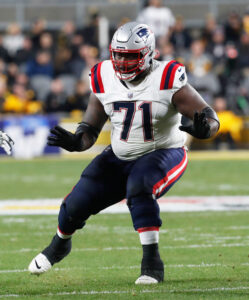 Neither the Chiefs nor the Broncos were blown away by the showings of Jawaan Taylor or Mike McGlinchey, but Taylor scored a $20MM-AAV payday (second among RTs) and McGlinchey a $52.5MM guarantee (third at the position). Onwenu not panning out to a team’s liking at RT would not cause as much damage, considering he primarily played guard in 2021 and ’22. PFF slotted Onwenu third at his position in 2021 and fourth in ’22. He checked in eighth at ESPN’s pass block win rate metric at guard in 2022.
Neither the Chiefs nor the Broncos were blown away by the showings of Jawaan Taylor or Mike McGlinchey, but Taylor scored a $20MM-AAV payday (second among RTs) and McGlinchey a $52.5MM guarantee (third at the position). Onwenu not panning out to a team’s liking at RT would not cause as much damage, considering he primarily played guard in 2021 and ’22. PFF slotted Onwenu third at his position in 2021 and fourth in ’22. He checked in eighth at ESPN’s pass block win rate metric at guard in 2022.
Onwenu’s RT past and age would place him at or near the top of a loaded guard FA crop. With Trent Brown all but set to leave Foxborough, the Patriots may need to replace two tackles. Their low-cost 2023 RT plan (Riley Reiff) lasted all of 45 snaps. With a rookie QB likely en route, the cap-rich Pats would stand to benefit by keeping their Day 3 find. The Titans have a need, if Nicholas Petit-Frere stays at left tackle. Many teams are in need. A deal north of $17MM per year, given the cap development, will be in play. Would the Raiders consider an ex-Patriot this soon after the NFL’s latest Patriot Way offering unraveled? They have needs at right tackle and right guard and have not done much in the way of O-line spending since disbanding their Rodney Hudson–Gabe Jackson nucleus.
Best fits: Patriots, Titans, Raiders
11. Robert Hunt, G. Age in Week 1: 28
The guard depth in this class reminds of 2017, when four guards (Kevin Zeitler, Larry Warford, Ronald Leary and T.J. Lang) all scored big paydays. With tackle depth minimal and the center market in a slump, expect some guard action early in free agency. Hunt may rival Onwenu’s payment, though here is betting the latter’s age and positional versatility give him the edge. Hunt will cash in, however, being the Dolphins’ most consistent 2020s O-lineman. With the Rams re-signing Kevin Dotson at $16MM per year, Hunt can expect to do very well soon.
Although Hunt is best known for a heroic 2021 end zone journey that did not count, he has offered stability to a Miami line that has lacked it at every other position. Moving Hunt from right tackle to right guard in 2021, the Dolphins found a good spot for the 2020 second-round pick. PFF slotted Hunt as a top-12 guard in each of the past two seasons, and although a hamstring injury cost him almost half the 2023 campaign, the inside cog served as an key role player during the Mike McDaniel– and Tyreek Hill-spurred offensive turnaround.
The Dolphins already committed to a less reliable starter, giving right tackle Austin Jackson a three-year, $36MM extension. Coupling that pact with Terron Armstead’s five-year, $75MM accord would not be a dealbreaker. But the team is about to be pot-committed on offense.
Hill remains the NFL’s highest-paid receiver, and a Tua Tagovailoa extension exceeding $50MM per year is likely on tap this offseason. Jaylen Waddle is also on the radar for a 2024 or ’25 payday. Keeping Hunt is probably a luxury Miami cannot afford. In addition to quality guards regularly doing well on the market, Hunt will seemingly benefit from the Kyle Shanahan scheme the Dolphins use being rather popular right now.
Best fits: Panthers, 49ers, Cardinals
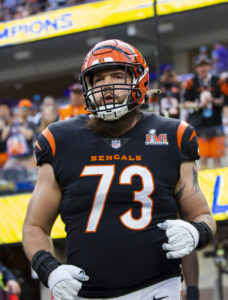 12. Jonah Williams, T. Age in Week 1: 29
12. Jonah Williams, T. Age in Week 1: 29
The Bengals swooping in for Orlando Brown Jr. last year changed their offensive line plan, kicking a surprised (and quickly disgruntled) Williams to right tackle. Cincinnati’s 2019 first-round pick spending three seasons at left tackle, including the team’s Super Bowl LVI slate, separates him from this year’s other top O-linemen bound for free agency. With the Bengals paying Brown and subsequently tagging Higgins, they appear prepared to let Williams walk after five years.
Never viewed as a great left tackle, as those do not typically reach free agency in their 20s, Williams still figures to do well here. Like last year, the market is thin on LT options. Williams themed his spring trade request around a move back to left tackle, and while a blindside return will probably be the Alabama alum’s goal, he logged a full season on the right side. PFF viewed a noticeable quality dip from 2021 to ’22, dropping Williams from a top-35 tackle to outside the top 60. It should be noted Williams played through a Week 5 kneecap subluxation in 2022. Prior to that, Williams anchored a talent-poor Bengals O-line on the Super Bowl stage.
That injury and the dislocated kneecap that kept Williams out of the 2022 AFC championship game represent knocks here, and he missed his 2019 rookie year due to a shoulder malady. But the 6-foot-5 tackle is a solid pass blocker and the top left tackle on the market — through a long-range lens, as Tyron Smith laps Williams in accolades. Even if Williams has not reached his potential, teams not in striking distance to draft one of this year’s top tackles will be OK paying up.
Best fits: Jets, Patriots, Saints
13. Marquise Brown, WR. Age in Week 1: 27
A 5-foot-9 receiver who has brought inconsistency since being chosen in the 2019 first round, Brown could drop to the “prove it” tier in a normal year. With the cap now past $250MM and teams in need of downfield threats, here is betting Hollywood will check in beyond that range. Like Calvin Ridley, Brown will benefit from the Buccaneers having given Mike Evans a third contract and the Bengals and Colts respectively tagging Tee Higgins and Michael Pittman Jr. A team that signs Brown will be betting on better circumstances boosting his late-20s prospects.
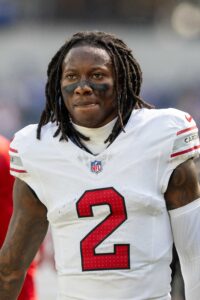 Tied to the NFL’s run-heaviest offense for three years, Brown asked out of Baltimore and rejoined college teammate Kyler Murray. Brown could not elevate his profile in Arizona. In Brown’s defense, this was not a good environment to do so. In a disjointed Murray-Kliff Kingsbury finale in 2022, the Pro Bowl QB suffered an ACL tear. Brown also battled injury troubles as a Cardinal, sustaining foot and heel issues over the past two years. While playing through the heel malady, Brown mostly worked with Joshua Dobbs as the Cardinals cratered. He posted just 574 yards in 14 games last season. Though, his average depth of target climbed to 11.9 after a year in Kingsbury’s station-to-station offense.
Tied to the NFL’s run-heaviest offense for three years, Brown asked out of Baltimore and rejoined college teammate Kyler Murray. Brown could not elevate his profile in Arizona. In Brown’s defense, this was not a good environment to do so. In a disjointed Murray-Kliff Kingsbury finale in 2022, the Pro Bowl QB suffered an ACL tear. Brown also battled injury troubles as a Cardinal, sustaining foot and heel issues over the past two years. While playing through the heel malady, Brown mostly worked with Joshua Dobbs as the Cardinals cratered. He posted just 574 yards in 14 games last season. Though, his average depth of target climbed to 11.9 after a year in Kingsbury’s station-to-station offense.
The Cardinals have expressed interest in keeping Brown. Given their endless praise for Murray, re-signing the former No. 1 pick’s top college weapon makes sense. Brown’s injuries also will factor into offers. Even with the cap spike, Hollywood Brown probably will not be able to skyrocket to the A.J. Brown–Deebo Samuel–D.K. Metcalf–Terry McLaurin tier; that starts at $23.3MM per year. Despite being chosen before each, Hollywood may fall toward or below the Diontae Johnson pact (2/36). Injuries aside, the Oklahoma alum is hitting free agency at a good time. This will be a curious market to monitor.
Best fits: Cardinals, Chiefs, Browns
14. Xavier McKinney, S. Age in Week 1: 26
The first team rumored to be considering a transition tag for a safety this year, the Giants passed on making that move and observed the Patriots keeping Kyle Dugger off the market via that rarely used tool. Only five transition tags have come out over the past 10 years, but this would have been a way for the Giants to ensure at least one of the McKinney/Saquon Barkley pair stays. As it stands, the team runs the risk of losing both for compensatory picks — and that is only if the add/subtract formula balances out. This would be a tough development for a coaching staff that has moved toward a hot seat.
Labeling himself the NFL’s most complete safety, McKinney probably falls short of that status. The former second-round pick has not made a Pro Bowl or All-Pro team, and two injuries have led to significantly abbreviated seasons. A broken foot delayed McKinney’s NFL debut in 2020 — a six-game season for the Alabama alum — and an ATV accident led to a nine-game 2022. In between, McKinney has been one of the Giants’ best defenders. His profile is a bit like Kamren Curl, with the Giants largely struggling on defense during McKinney’s tenure. But with Dugger and Antoine Winfield Jr. off the market, McKinney’s value is pointing upward.
McKinney played every Giants defensive snap last season; Pro Football Focus graded him as its No. 4 overall safety. He intercepted three passes, forced a fumble and tallied a career-high 116 tackles in his contract year. He could be the Jessie Bates of this year’s safety market, commanding the top salary. Though, Curl should also do well post-cap spike. The Giants are unlikely to keep McKinney off the market at this stage; a defection would continue a pattern of Big Blue not retaining safeties. Landon Collins, Jabrill Peppers and Julian Love became one-contract players in New York. A McKinney payment factored into the Giants’ Love offer last year, but the team is close to needing to start over on its back line.
Best fits: Packers, Giants, Jets
15. Jonah Jackson, G: Age in Week 1: 27
No guard Zoom meeting will be necessary — unless they want to celebrate their position’s good fortune — and teams that need immediate interior help can turn to the market. Like Isaac Seumalo last year, Jackson is set for free agency after being part of a top-flight O-line. Jackson will enjoy the chance to test the market after the recent cap explosion, boosting the four-year Lions starter’s prospects and others like him.
Chosen in the 2020 third round, Jackson became an immediate starter. The Bob Quinn-era draftee was part of the Brad Holmes–Dan Campbell rebuild, and while Ben Johnson is primarily credited with the Lions’ offensive breakthrough, the team had a stout O-line aiding the ascent. Jackson boosted Jamaal Williams to a career year in 2022; the boisterous back led the NFL in rushing TDs (16). The Lions then rolled out a dynamic two-back duo, and as Jahmyr Gibbs stole the show late, David Montgomery morphed from unsexy fantasy pick to league winner. Goff: also improved.
Jackson has been a better run blocker compared to his pass-pro work, which could create a gap between the Onwenu-Hunt tier and the next group of guards. Jackson has a longer track record than Ben Powers ($13MM AAV) and is three years younger than Seumalo (three years, $24MM). That said, playing between Taylor Decker and Frank Ragnow for extended stretches helped. Teams will take that into consideration.
Reminding more of Nate Davis (four years, $40MM) as a Day 2 pick who became a four-year starter, Jackson should do well in free agency. The Lions probably cannot afford him, with Penei Sewell set to join Frank Ragnow as a young highly paid blocker. Goff and Amon-Ra St. Brown extensions will also change the calculous in Detroit.
Best fits: Commanders, Giants, Panthers
16. Leonard Williams, IDL. Age in Week 1: 30
Williams has played the contract game well. A former No. 6 overall pick, the ex-New York resident was franchise-tagged twice. The threat of the second tag going on the Giants’ books in a 2021 offseason that brought the COVID-19-generated cap reduction led to Williams scoring a wildly player-friendly contract. The Giants gave the sporadically productive D-lineman a three-year, $63MM deal with $45MM guaranteed at signing. The Williams deal surely helped influence Aaron Donald’s 2022 tactics, and the Giants paid most of its balance to collect a strong return from the Seahawks at last year’s trade deadline.
Producing incongruous sack/QB hits numbers during his Jets tenure, Williams managed to get home at the right time. The USC alum’s 2020 season on the tag (11.5 sacks, 30 QB hits — both career-high marks) brought that monster extension and kept him off the tag radar henceforth. Williams has not posted more than seven sacks in a season in any other year; he tallied 5.5 (four as a Seahawk) and 16 QB hits in 2023. Williams also has an extensive track record as a quality run defender, though his best work on that front came back in his Jets days.
Justin Madubuike being taken off the market helps Williams, who has been a 3-4 D-end — though, the proliferation of nickel sets has blurred 4-3/3-4 distinctions – throughout his career. Despite changing coaching staffs, the Seahawks are interested in retaining Williams. Though, the Giants footing their previous Williams bill and the presence of Dre’Mont Jones’ $17MM-AAV deal on their payroll complicates that matter. Ex-Giants DC Patrick Graham’s Las Vegas presence could be relevant here, and Antonio Pierce’s team is among the many needing interior help.
Best fits: Raiders, Seahawks, Jaguars
17. Chase Young, Edge. Age in Week 1: 25
Young’s pedigree coming into the NFL and his status after a Defensive Rookie of the Year season makes it rather odd he is on this list. Had the former No. 2 overall pick not suffered a torn ACL and ruptured patellar tendon, Washington would have likely picked up his fifth-year option and strongly considered an extension this offseason. Young, though, did not start the 2021 season well and did not make the kind of impact the 49ers wanted upon acquiring him at last year’s deadline. Thus, one of the top defensive talents to come into the league this century carries uncertainty into free agency.
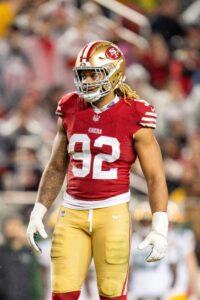 The Ohio State product would seem overqualified for a “prove it” pact, but it is not out of the question that is where this goes. Ex-No. 1 pick Jadeveon Clowney has made a career out of higher-end one-year deals, and fellow former first-rounder Marcus Davenport needed to take that route after an inconsistent Saints tenure. Multiple D-ends being tagged will help Young, but with money set to go to the likes of Greenard, Hunter and Huff, what will be out there for the former Heisman finalist? Young’s age and potential upside will work in his favor, and his contract year was not all bad.
The Ohio State product would seem overqualified for a “prove it” pact, but it is not out of the question that is where this goes. Ex-No. 1 pick Jadeveon Clowney has made a career out of higher-end one-year deals, and fellow former first-rounder Marcus Davenport needed to take that route after an inconsistent Saints tenure. Multiple D-ends being tagged will help Young, but with money set to go to the likes of Greenard, Hunter and Huff, what will be out there for the former Heisman finalist? Young’s age and potential upside will work in his favor, and his contract year was not all bad.
Young totaled five sacks in eight Commanders games last year, though he has drawn scrutiny for freelancing. Even though Young finished with just 7.5 sacks in 2023, he registered more pressures (25) and QB hits (15) than he did in his 2020 DROY season. Teams could sense a buy-low opportunity here, provided the chance to land Young on a multiyear deal at a potentially middle-class rate. Clubs will certainly be leery of Young’s past three seasons, however.
The Ravens and Jaguars pursued Young at last year’s deadline, and the former has needed edge rushers each year since Matt Judon’s exit. Clowney and Kyle Van Noy are headed back to free agency. The Bears also showed interest in Young, who will cost far less than Montez Sweat. Though, it would be a bit unusual for the Bears to reunite the Commanders pair. Young will be one of this year’s most interesting UFAs.
Best fits: Ravens, Rams, Falcons
18. Kamren Curl, S. Age in Week 1: 25
Washington’s defense became a wasteland during the season’s second half, falling off from its 2022 perch. Curl served as one of the best parts of the Ron Rivera-era Washington rosters, rising from seventh-round pick into steady safety. A well-rounded player, Curl graded as PFF’s second-best safety in 2022. Hitting the market ahead of his age-25 season will benefit the former late-round flier.
Near the top of the NFL in cap space, the Commanders have the money to keep Curl. Though, they are transitioning after years of mediocrity and a 2023 freefall. Curl also has not forced many turnovers as a pro, intercepting three passes as a rookie and none since. He has forced one career fumble. How far will teams go to procure the services of a solid but unspectacular safety?
Last year’s market stalled out after Jessie Bates’ $16MM-per-year windfall. A crowded crop yielded no other payment north of $8MM per annum. Grant Delpit bridged that gap in December, signing a $12MM-AAV Browns extension. That deal will likely be relevant for the Curl camp, as will the Chiefs and Cardinals’ respective $20MM guarantees at signing for Justin Reid and Jalen Thompson. They are among the NFL’s seven safeties who signed for $20MM locked in. Curl and McKinney will take aim at joining them.
Best fits: Commanders, Eagles, Bills
19. Kendall Fuller, CB. Age in Week 1: 29
The Chiefs taking L’Jarius Sneed off the free agent market represents good news for the player he replaced in 2020. With Sneed and Jaylon Johnson out of play, cornerback-needy teams will need to take a long look at Fuller. Although third CB contracts are dicey propositions, Fuller has positioned himself to cash in due to this market’s outlook.
The two-stint Washington cover man is just two years older than Sneed. He also gives teams options, having logged extensive time in the slot earlier in his career before sliding to a perimeter role in recent years. Fuller rarely came off the field on defense during his second stint in Washington; his participation rate went 99%-97%-99%-100% from 2020-23. He rated as a top-15 corner, per PFF, in each of the past three seasons. Pro-Football-Reference’s coverage metrics were less kind in 2023, tagging Fuller with a 120.4 passer rating allowed as the closest defender — far north of his 2021 and ’22 numbers — and an alarming nine touchdowns allowed. Though, the Commanders spent half the season without starter-caliber edge rushers to limit the defense’s capabilities.
Fuller fared better in Washington than William Jackson, though it will be interesting to see if teams dock Fuller and Curl for being part of the NFL’s worst defense last season. A player with a similar profile, Cameron Sutton, scored a three-year, $33MM deal ($21MM guaranteed) ahead of his age-28 season last year. It would surprise if Fuller cannot surpass that on this Johnson- and Sneed-less market.
Best fits: Lions, Colts, Texans
20. Lloyd Cushenberry, C. Age in Week 1: 26
For a good example of a contract-year breakout, look to Denver. Center stood as a shaky area for the Broncos during Cushenberry’s first three seasons. A conveniently timed emergence stabilized it, and with the Broncos set to absorb an astonishing amount of dead money via the Russell Wilson mistake admission, their center position will probably destabilize soon. Given the slow-moving center market and the fast-rising cap, Cushenberry’s improvement could be a gateway to a top-five contract among snappers.
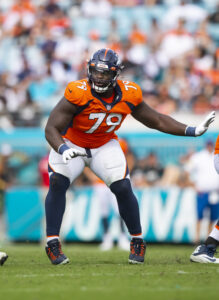 A third-round 2020 draftee, Cushenberry struggled but only came off the field in that span due to a 2022 injury. He played every Denver offensive snap from 2020-21. A groin strain sidelined Cushenberry in October 2022, and while the LSU alum was believed to be ready to return, the Broncos ran low on IR-return moves and did not activate him. Cushenberry responded by starting 17 games for a much healthier Denver O-line in 2023, ranking 11th among all interior O-linemen in pass block win rate. Long Cushenberry skeptics, PFF slotted him 10th at center.
A third-round 2020 draftee, Cushenberry struggled but only came off the field in that span due to a 2022 injury. He played every Denver offensive snap from 2020-21. A groin strain sidelined Cushenberry in October 2022, and while the LSU alum was believed to be ready to return, the Broncos ran low on IR-return moves and did not activate him. Cushenberry responded by starting 17 games for a much healthier Denver O-line in 2023, ranking 11th among all interior O-linemen in pass block win rate. Long Cushenberry skeptics, PFF slotted him 10th at center.
The Broncos going through three offensive systems in three years certainly made their center’s job difficult, but he salvaged his rookie contract at the 11th hour. Although the 2023 center market allowed teams to re-sign their pivots at lower-middle-class rates — or near the league minimum, in the Jets’ case — Cushenberry will probably command an eight-figure AAV. The Commanders and Titans have center needs and cash to burn around rookie-QB salaries, but several teams are in need. This could be one of the better-timed breakouts in recent O-line history.
Best fits: Commanders, Titans, Jaguars
21. Dorance Armstrong, Edge. Age in Week 1: 27
A supporting-caster in a deep Dallas group, Armstrong may be a sleeper this year. Despite going into his seventh season, the former fourth-round pick will not turn 27 until June. The Cowboys quickly pivoted to a second Armstrong contract in 2022, doing so after not matching what the Bills gave Von Miller. The Armstrong move also doubled as a fallback option after the 11th-hour Randy Gregory negotiation breakdown. Dallas’ consolation prize became a better investment than the higher-profile vets. He will outdo his most recent two-year, $12MM deal.
Yes, Armstrong enjoyed good circumstances. He played alongside one of this era’s best defenders, Micah Parsons, and DeMarcus Lawrence also provided veteran support. Armstrong totaled 16 sacks over the past two seasons, getting there despite starting just six games in that time. Though, the situational rusher did not eclipse 20 pressures in either season. Armstrong will not be paid like a No. 1 rusher, but even though his peripheral stats are lighter, a team will pay him to be its sidekick sack artist.
This year’s coordinator carousel makes two teams jump out as destinations. The Commanders may be aiming higher, but they need to add at least one starting defensive end in free agency. Armstrong played under Dan Quinn for three seasons. New Seahawks DC Aden Durde was Armstrong’s position coach, and the Seahawks have Darrell Taylor bound for free agency while Uchenna Nwosu is coming off a torn pec. The Nwosu and Dre’Mont Jones deals may make a third veteran front-seven piece a bit pricey, particularly if Bobby Wagner and Jordyn Brooks are back.
Best fits: Commanders, Lions, Seahawks
22. Grover Stewart, IDL. Age in Week 1: 30
This provides a new phase for GM Chris Ballard, with potential third contracts entering the equation for the draft-and-develop Colts boss. The veteran exec has done well to extend his draft choices or homegrown UDFAs; Stewart and Kenny Moore are the first Ballard-era cornerstones to play out their second deals. A durable inside presence, Stewart incurred a six-game PED suspension last year. The veteran’s absence showed against the run.
The Colts allowed 107.9 rushing yards per game with Stewart suited up; during his six-game ban, Indianapolis yielded 153 on the ground. A full yard-per-carry gap (3.7 with, 4.7 without) illustrates the difference as well, via The Athletic’s James Boyd. ESPN’s run stop win rate metric slotted Stewart third among interior D-linemen against the run; PFF ranked Stewart fifth in run stoppage. Prior to the suspension, the 2017 Colts draftee had not missed a game since his second season. The veteran DT also provided some support in the pass rush, totaling four sacks in 2022 and a career-high eight QB hits in his suspension-abbreviated slate.
Among active contracts, 22 DTs received at least $20MM guaranteed at signing. Though, it should be noted only five got there on third contracts. Dalvin Tomlinson did so, fetching a four-year, $57MM Browns deal going into his age-29 season. Stewart will turn 31 later this year. While that will limit what comes in free agency, the cap spike and the 2017 fourth-rounder’s durability will help his cause. Stewart played out a three-year, $30.75MM extension; his third contract should rival it.
Best fits: Colts, Cardinals, Chiefs
23. Gabe Davis, WR. Age in Week 1: 25
Inconsistency in one of the league’s best passing offenses will give teams pause, but Davis is a young talent who has excelled at a skill that costs annually. Among NFL regulars active since 2020, Davis’ 16.7 yards per reception ranks third leaguewide. Scoring at least six touchdowns in each of his four seasons, Davis provided Josh Allen with a big-play threat. Do not be surprised if the bidding here becomes active due to Davis’ age, big-play production and franchise tags depleting the receiver market.
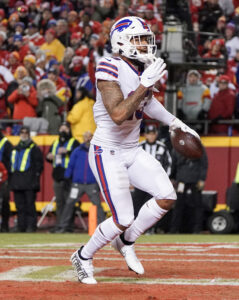 Davis’ big-play penchant was best spotlighted in his four-touchdown divisional-round performance in Kansas City — a game that is probably remembered differently had the Bills managed to take time off the clock following Davis’ fourth TD grab. Doing some of his own PR, a recent Davis video mentions the former fourth-round pick leading the NFL in first-down rate, touchdown rate and average depth of target since 2020. The former fourth-round pick amassing these numbers at 225 pounds will be a draw for teams, as the Central Florida alum’s best football may well be ahead.
Davis’ big-play penchant was best spotlighted in his four-touchdown divisional-round performance in Kansas City — a game that is probably remembered differently had the Bills managed to take time off the clock following Davis’ fourth TD grab. Doing some of his own PR, a recent Davis video mentions the former fourth-round pick leading the NFL in first-down rate, touchdown rate and average depth of target since 2020. The former fourth-round pick amassing these numbers at 225 pounds will be a draw for teams, as the Central Florida alum’s best football may well be ahead.
The obvious counterargument here points to Allen’s importance in those deep-ball figures, but six wideouts since 2020 (Allen Lazard, Christian Kirk, Allen Robinson, Kenny Golladay, Corey Davis and Curtis Samuel) have collected at least $20MM fully guaranteed in free agency. This is not the best collection of WR2s, but Davis’ size, age and production give him a route to this list. Another New York-based team run by ex-Bills staffers could certainly use a starting wideout.
Best fits: Giants, Bears, Patriots
24. Saquon Barkley, RB. Age in Week 1: 27
After injuries sidetracked Barkley in the aftermath of his Offensive Rookie of the Year season, he re-emerged to carry a limited Giants offense to the playoffs. Barkley’s franchise tag standoff played a lead role in the running back position’s 2023 crisis, with the star Giant joining Josh Jacobs and Tony Pollard in being tagged and not extended. While Jacobs and Pollard could not match their 2022 form, Barkley played well for a Giants team that again relied on him as just about everything else on their offense fell apart.
Barkley rebounded from an early-season high ankle sprain, missing only three games and returning to threaten defenses despite low-end QB play from each of the three passers New York used. Also running behind an injury-riddled O-line, Barkley managed 1,242 scrimmage yards and 10 touchdowns. The former No. 2 overall pick has not flirted with his yards-per-touch figures or receiving yardage numbers from the Pat Shurmur years. That will be a factor in a free agency that looks like it will lead the New Jersey native out of the Big Apple.
 The aerial component, injury troubles and wear and tear hurt Barkley’s market, and seasons on a fifth-year option and franchise tag will limit the two-time Pro Bowler’s value. But Barkley made it to the 2023 finish line without another notable injury; against some odds, he looks like this year’s top RB free agent. Of course, the position’s gradual decline — which included another slope last year — and the readiness of college prospects to eventually fill needs will leave some veterans out of luck and likely will play into the top UFAs’ markets.
The aerial component, injury troubles and wear and tear hurt Barkley’s market, and seasons on a fifth-year option and franchise tag will limit the two-time Pro Bowler’s value. But Barkley made it to the 2023 finish line without another notable injury; against some odds, he looks like this year’s top RB free agent. Of course, the position’s gradual decline — which included another slope last year — and the readiness of college prospects to eventually fill needs will leave some veterans out of luck and likely will play into the top UFAs’ markets.
Wanting to finish his career with the Giants, the New Jersey native had been expected to receive an offer. As of the Combine, the sides were still talking. Tagged minutes before last March’s deadline — so the Giants could give Daniel Jones a $40MM-AAV accord with $81MM guaranteed — Barkley declined a subsequent summer proposal. The Giants were believed to have increased the guaranteed money — into the $22MM neighborhood — but reduced the AAV (south of $12MM). After playing on the tag, anything beyond $12MM guaranteed this year is a win for the six-year Giant. That almost definitely will be attainable.
Only one non-rookie RB deal (Christian McCaffrey’s) remains with a guarantee beyond $20MM. Will a similar offer still be there on a market that stands to include Jacobs, Pollard, Austin Ekeler, Derrick Henry, D’Andre Swift and Gus Edwards? By passing on the Giants’ July proposal, Barkley bet there would be.
Best fits: Texans, Ravens, Giants
25. D.J. Reader, IDL. Age in Week 1: 30
Entering December, it looked like Reader played his cards right. The former Texans draftee signed a four-year, $53MM Bengals deal — just as Joe Burrow’s rookie contract made Cincy change course regarding outside free agents — and gave the team an interior anchor on defense. But Reader suffered a torn quad early in Week 15. The eight-year veteran now has torn both quads since 2020, which will impact his hopes at a second big-ticket FA accord.
These setbacks should give teams pause and will reduce Reader’s value. While he rebounded well from the 2020 injury, doing so at 30 will be a different matter. Still, Reader should generate a good market as a third-contract-seeking free agent. That is not exactly common in the NFL, but Reader regularly commanded double-teams in Cincinnati and played a role in his fellow D-linemen powering the team’s pass rush. PFF rated Reader as a top-11 D-tackle in each of the past three seasons.
Best fits: Raiders, Dolphins, Cowboys
26. Jordyn Brooks, LB. Age in Week 1: 26
Among the four linebackers to see his fifth-year option declined in 2023, Brooks has been the most productive player. The surprise Seattle first-rounder strung together 184- and 161-tackle seasons. After an ACL tear late in the 2022 season, Brooks returned by Week 1 and started 16 games. Back alongside Bobby Wagner last year, he added 4.5 sacks — more than his 2020-22 season totals combined. While not on the Pro Bowl level like Patrick Queen, Brooks should still command a nice market.
Last year’s LB free agency mirrored the safety market, with a Tremaine Edmunds-and-everyone-else vibe emerging. That said, Foye Oluokun parlayed a similar profile to Brooks’ into a three-year, $45MM Jaguars deal that featured $28MM guaranteed at signing in 2022. It is not out of the question to see Brooks score a contract in that range — or just south of that, the Matt Milano neighborhood — now that everyone carries more cap space than expected and the Texas Tech product more than a year removed from his knee injury.
Best fits: Cowboys, Steelers, Seahawks
27. Connor Williams, OL. Age in Week 1: 27
If teams are confident in Williams’ recovery from ACL surgery, the two-year Dolphins starter should do a bit better than this placement. But the timing of his injury — Week 14 of last season — will hurt the former Cowboys draftee.
Prior to the December setback, Williams was one of the pillars on a Dolphins offensive line already beset by injuries. Both Miami guard starters missed extensive time last season, yet Williams continued to show the Dolphins’ 2022 position switch was a smart move. A one-year guard starter in Dallas, Williams played left tackle at Texas. In his two Dolphins seasons, PFF graded the former second-round pick as the fourth- and second-best center. Williams thrived in the run game, helping Raheem Mostert to a dominant season that produced the NFL’s TD title (21) and standing out on DVOA’s No. 2-ranked offense.
Williams skipped Miami’s minicamp in hopes of redoing his two-year, $14MM deal ahead of last season. This could be an opportunity for a team to land Williams at a slightly below-market rate. Teams are more likely to devote notable free agency funds to interior help, due to the dearth of quality tackles available. Had Williams stayed healthy, he would have been a near-lock to become the seventh eight-figure-AAV center. Will he get there anyway?
Best fits: Cardinals, Chargers, Dolphins
28. Josh Jacobs, RB. Age in Week 1: 26
Next Gen Stats ranked Jacobs fifth in rushing yards over expected (158) in 2022 and slotted him as the fifth-worst rusher in this metric last season (minus-86), presenting a dilemma for teams eyeing the youngest of the ex-rushing champions on this year’s market. Jacobs did not run behind an elite offensive line when he won the rushing crown, and following Josh McDaniels’ firing, the former first-round pick displayed better form in 2023. On another crowded RB market, placing Jacobs is difficult.
 The first Raider to win a rushing title since Marcus Allen, Jacobs totaled 2,053 scrimmage yards in 2022. He has three 1,000-yard seasons on his resume and brings less injury baggage than Saquon Barkley. The latter has proven a more dynamic talent and, despite entering the NFL earlier, the Giants back has logged 104 fewer career carries (1,305-1,201). Jacobs also missed the final four games of the season due to multiple contusions, leading to backup Zamir White producing two 110-yard games — matching Jacobs’ full-season total last year — in relief.
The first Raider to win a rushing title since Marcus Allen, Jacobs totaled 2,053 scrimmage yards in 2022. He has three 1,000-yard seasons on his resume and brings less injury baggage than Saquon Barkley. The latter has proven a more dynamic talent and, despite entering the NFL earlier, the Giants back has logged 104 fewer career carries (1,305-1,201). Jacobs also missed the final four games of the season due to multiple contusions, leading to backup Zamir White producing two 110-yard games — matching Jacobs’ full-season total last year — in relief.
The state of the running back position needs little explaining at this point, and Jacobs will be among the high-profile vets — a cast that could soon include Joe Mixon — seeking to score paydays from the minimal number of teams eyeing an experienced runner. Jacobs would have presented far more value than Miles Sanders on last year’s market, but the pesky franchise tag intervened and allowed the Raiders to add 270 more touches to the Alabama alum’s odometer. Jacobs’ light college use (251 totes) may still come up among personnel departments this offseason, and he should have some prime form left.
Would the Cowboys consider swapping out Tony Pollard’s tag for an upper-tier Jacobs payment? Dallas, which as you may have heard is “all in,” missed the every-down punch Ezekiel Elliott once provided. The Chargers are also preparing to make a bigger run-game commitment under Jim Harbaugh and Greg Roman. Jacobs was among the loudest voices stumping for Antonio Pierce; while that would seem a fit, GM Tom Telesco, as our Adam La Rose points out, is coming off a year in which he let Austin Ekeler explore a trade before greenlighting a minuscule incentive package to bring him back into the fold. Telesco holding roster control introduces a wild card into the Raiders-Jacobs reunion storyline.
Best fits: Raiders, Chargers, Cowboys
29. Frankie Luvu, LB. Age in Week 1: 27
The NFC South featured a second Demario Davis-like presence over the past two years. Luvu decided to take aim at the Saints blitzer by putting together two seasons with at least 110 tackles and 5.5 sacks. Luvu, who played out a two-year deal worth $9MM, can expect a raise soon. The former Jets UDFA was among the best Panthers facets (not a high bar) over the past two seasons. How will the league evaluate this hybrid talent of sorts?
A starter as a rush linebacker during his senior season at Washington State, Luvu has experience as a pure pass rusher. He did not provide an extended showcase of capabilities as an off-ball ‘backer at the Pac-12 program but combined for 236 tackles (29 for loss) over the past two seasons. Luvu’s TFL number needs no qualifiers, as only nine players have amassed more over the past two years. All nine are D-linemen or 3-4 OLBs, separating the ascending performer.
Seeing the breakthrough producer land with a contender would be a fun development, as the American Samoa native’s work has been largely obscured in Charlotte. Though, it makes sense why the Panthers want him back.
Best fits: Panthers, Chiefs, Eagles
 30. Justin Simmons, S. Age in Week 1: 30
30. Justin Simmons, S. Age in Week 1: 30
The Broncos made a late change to the safety market, turning their longest-tenured player into a cap casualty. Simmons’ age should keep him off the Xavier McKinney–Kamren Curl tier, but he is still talented enough to provide a significant upgrade for many teams. This also will be a chance for the former third-round pick — drafted two months after the Broncos’ Super Bowl win in 2016 — to land with a contending team. Simmons has been one of the best safeties in recent years, replacing T.J. Ward in Denver’s lineup back in 2017, but has not played in a playoff game.
The rangy cover man has intercepted 30 passes over the past eight seasons, leading the NFL in that span. Despite missing five games due to injury in 2022, Simmons paced the NFL with six picks. His 2020 and ’21 slates, which included five INTs apiece, disproved that showing as an outlier. Simmons does not have any first-team All-Pro nods on his resume, but the Denver DB cornerstone has lived on the second team. Simmons has four second-team All-Pro cameos, earning such recognition in four of the past five years. The beginning of this stretch led to a then-record safety accord (four years, $61MM), which came after the Broncos franchise-tagged Simmons for a second time.
That contract turned into a bit of a bargain for the Broncos, as the Seahawks raised the safety ceiling by a notable margin after extending Jamal Adams later in 2021. As the Broncos’ quarterback search passed the five-year mark, Simmons and Patrick Surtain raised the team’s floor on the defensive side. Simmons excelled under Vance Joseph, Vic Fangio and Ejiro Evero, displaying scheme versatility. Tyrann Mathieu collecting a three-year, $27MM deal, at 30, two years ago bodes well for Simmons. The Eagles need a safety, and while Simmons played in Fangio’s scheme for three seasons, would the team sign up for another 30-something in the secondary?
Best fits: Bills, Eagles, Jets
31. Andre James, C. Age in Week 1: 27
The Raiders saw enough from James to extend him before his starter tenure began. Like they did with Darren Waller, the Silver and Black bought low effectively. James played out a two-year, $8.65MM agreement. That was two GMs ago. After three years in place as a starting center in Las Vegas, the former UDFA will be looking to do better on a market that brings a host of interior-line options.
Called upon as a low-cost Rodney Hudson replacement in 2021, James started 48 games over the past three seasons. He played a key role in unleashing Josh Jacobs during the RB’s 2022 rushing title surge, and pass block win rate slotted the UCLA alum third overall in 2023. James broke up the all-Chiefs bloc in the top four of that metric. Although no center scored more than $6MM per year on the 2023 market, James is among a few options who could do so this year.
Best fits: Chargers, Steelers, Rams
32. Jon Runyan Jr., G. Age in Week 1: 27
At some point, the money will dry up as teams shift focus to the second day of the draft to staff this position. But plenty of teams need help. And the 2011 CBA reshaped O-line development, with the 2020 agreement further limiting offseason prep up front. That helps provide landing spots for vets. Starting three seasons for the Packers, Runyan can certainly help a team as an immediate first-stringer and someone who should be able to deliver a few quality seasons rather than become purely a short-term fix.
The Packers, who gave Elgton Jenkins a top-market extension late in the 2022 season, are likely to let Runyan move on. Green Bay has seen some interior O-linemen cash in elsewhere over the past several years — from Corey Linsley to T.J. Lang to Josh Sitton. Runyan will probably do well, too.
Runyan ranked 17th in pass block win rate last season and has started 50 games over the past three years. The former sixth-round pick has lined up at both guard spots. PFF has never graded the Michigan alum as a top-30 guard, docking him as run blocker. But a growing number of teams are running the Kyle Shanahan-inspired offense, making Runyan a fit for a few teams. A certain New York-based team — with some major line needs — is pretty into ex-Packers still, right?
Best fits: Jets, Dolphins, Cardinals
33. Tyron Smith, T. Age in Week 1: 33
A high-end one-year deal might be where this ends; injuries have interrupted Smith for much of his career. But it is not out of the question a team hands out a multiyear pact. The Dolphins gave Terron Armstead a five-year, $75MM deal despite his annual injury issues. A likely Hall of Famer who landed on the 2010s’ All-Decade team, Smith is better than Armstead. He is coming off a 13-game season; it would be wrong not to include the 6-foot-8 marvel on this list. This could even be low, if a team is willing to gamble on Smith’s talent. Though, durability is a glaring concern as the 13-year veteran seeks out a third contract a bit later than he should have.
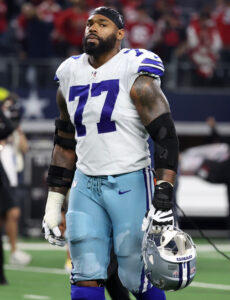 The NFL’s longest-running contract is no more. Smith held that distinction for many years, being tied to the same deal from 2014-23. The Cowboys locked their 2011 first-rounder in during the 2014 offseason, giving him an eight-year, $97.6MM extension. The Cowboys prefer longer-term deals, but while Zack Martin’s holdout forced the team to buckle last year, Smith’s injuries limited his leverage. Smith probably should have held out for a four- or five-year extension back in 2014, which would have given him a chance to cash in again before the 2020s brought major setbacks. But the athletic blocker has still banked more than $100MM as a pro.
The NFL’s longest-running contract is no more. Smith held that distinction for many years, being tied to the same deal from 2014-23. The Cowboys locked their 2011 first-rounder in during the 2014 offseason, giving him an eight-year, $97.6MM extension. The Cowboys prefer longer-term deals, but while Zack Martin’s holdout forced the team to buckle last year, Smith’s injuries limited his leverage. Smith probably should have held out for a four- or five-year extension back in 2014, which would have given him a chance to cash in again before the 2020s brought major setbacks. But the athletic blocker has still banked more than $100MM as a pro.
Last season, Smith held up for 942 snaps, missing four games. He collected his first All-Pro nod since 2016, ranking as PFF’s No. 4 overall tackle and ranked fourth in ESPN’s run block win rate metric. Elite when healthy, Smith is a dice roll. But he is too talented not to draw considerable attention in his first free agency foray. With Tyler Smith still on a rookie deal, the Cowboys are still open to a third Tyron Smith contract. But it appears he is aiming higher; a Dallas return may be contingent on this market underwhelming. The Chiefs have an opening after giving Donovan Smith a one-year deal.
Best fits: Chiefs, Jets, Cowboys
34. Noah Fant, TE. Age in Week 1: 26
The only fifth-year option the Seahawks have exercised came on a player acquired via trade. The Russell Wilson trade piece has not quite justified his first-round pedigree, but tight end is typically a position in which growth takes place later. Last year’s rookie class proved a bit of an aberration, and the loaded group caused teams to devalue the 2023 free agent crop. Fant is among the best tight ends available this year, and his numbers are a bit better than you think.
 Not exactly a must-have in 12-team fantasy leagues, Fant has two 670-yard receiving seasons on his resume. Both came on Denver teams battling through the franchise’s annual QB issues. The Seahawks did not utilize Fant in the same way. After back-to-back 90-target seasons as a Bronco, the Iowa alum drew only 82 in two Seahawk seasons. Still, Fant is young, durable (two career games missed) and clocked a sub-4.5-second 40 time at the 2019 Combine.
Not exactly a must-have in 12-team fantasy leagues, Fant has two 670-yard receiving seasons on his resume. Both came on Denver teams battling through the franchise’s annual QB issues. The Seahawks did not utilize Fant in the same way. After back-to-back 90-target seasons as a Bronco, the Iowa alum drew only 82 in two Seahawk seasons. Still, Fant is young, durable (two career games missed) and clocked a sub-4.5-second 40 time at the 2019 Combine.
The Hawkeyes’ TE pedigree should not be discounted here. While Fant is not George Kittle, T.J. Hockenson or Sam LaPorta, it would be interesting to see him on a contending team. The 6-foot-4 weapon will not cost as much as Dalton Schultz, but Schultz’s Texans deal moves the rest of this year’s TE crop up the board. After getting little from their tight ends post-C.J. Uzomah, the Bengals would make sense as an interested party. Would Sean Payton consider bringing Fant back to Denver? His team has next to nothing there presently.
Best fits: Bengals, Panthers, Broncos
35. Za’Darius Smith, Edge. Age in Week 1: 32
Moving past his back injury with 16-game seasons in each of the past two years, Smith may have one more notable contract in the tank. He is on the older end as a pass rusher but profiles as a player who should generate interest as a dependable sidekick rusher. Smith showed following the back injury that spoiled his 2021 slate he can function well in that role, working opposite Myles Garrett and Danielle Hunter.
Smith has continued to rack up QB hits. While the sack numbers fell off after his bounce-back 10-sack effort in Minnesota, the ex-Baltimore draftee produced his fifth 20-plus-hit season in his past five healthy years. His 106 QB hits are 10th since 2019, and that is with a one-game 2021 factored in. Often moving inside in Cleveland, the proven sacker offers teams a malleable rusher who has shown he can still produce into his early 30s.
Although last year’s edge market featured a notable lull for the veteran wing, dragging into the summer, a few edges in Smith’s age range have fetched eight-figure-per-year deals. Robert Quinn landed $30MM at signing from the Bears in 2020, rewarding them with a 17-sack showing in his 11th season. Going into Year 10, Smith should generate interest from contenders seeking edge wingmen.
Best fits: Ravens, Lions, Bears
 36. Hunter Henry, TE. Age in Week 1: 29
36. Hunter Henry, TE. Age in Week 1: 29
Part of the Patriots’ 2021 free agency splurge, Henry fared a bit better than it seemed. The highlights just came as the Patriots were spiraling toward the NFL’s basement for the first time in 30 years. Signing a three-year, $37MM deal, Henry became a fairly forgotten eight-figure-per-year player as New England declined. The ex-Philip Rivers and Justin Herbert option averaged north of 12 yards per reception in 2021 and ’22, and it is worth wondering if some teams will view the eight-year veteran as an asset trapped in bad circumstances for two seasons.
Henry largely shook the injury issues that plagued him in Los Angeles, missing only three games across his Foxborough stay. Henry totaled 17 touchdown grabs as a Patriot, including nine in 2021 — perhaps a more relevant reference point given the disarray the past two Pats offenses brought. Playing for three OCs in three seasons, the former No. 35 overall pick showed he remains a viable supporting-caster.
Neither free agency nor the draft appears set to produce a deep tight end crop, and Henry suitors should be there. Henry hit 650 yards in 12 games in 2019, drawing a Chargers franchise tag, and 610 in 14 the following year. A middle-class third contract, at worst, should await a player who joined the Patriots at a bad time.
Best fits: Chargers, Bengals, Patriots
37. Azeez Al-Shaair, LB. Age in Week 1: 27
A 2022 injury and a crowded 2023 off-ball linebacker market led to Al-Shaair taking a “prove it” deal (one year, $5MM) with the Titans. All he did was tally the most tackles in a season during the Tennessee period of that franchise’s history. Al-Shaair, who reunited with ex-49ers exec Ran Carthon during the latter’s first year as Titans GM, totaled 163 stops in his first full-season run as a full-timer.
Stationed as the third linebacker behind Fred Warner and Dre Greenlaw in San Francisco, Al-Shaair showed in Tennessee he can be an every-down player. A better market should follow. PFF viewed the former UDFA as a better run defender but did not view the Florida Atlantic alum as a full-on liability in coverage. That facet of Al-Shaair’s game will shape his market. A few 49ers tributaries exist around the league.
As the Titans overhaul their defensive scheme around Dennard Wilson, Al-Shaair is believed to have interest in rejoining DeMeco Ryans in Houston. The Texans have cash to burn and one ILB need, should Blake Cashman depart. While not on the Queen tier, Al-Shaair should do better than he did in 2023. There are not too many teams likely ready to dole out middle-class cash on ILBs; Al-Shaair should still be one of the ‘backers on the good side of that equation.
Best fits: Texans, Broncos, Steelers
38. Kenny Moore, CB. Age in Week 1: 29
Chris Harris’ performance during the 2010s elevated the profile of the slot cornerback position. Although Harris played outside in base sets and shifted to his better role in Broncos sub-packages, the No Fly Zone pillar scored an $8.5MM-per-year extension late the 2014 season. In the years since the All-Decade CB’s prime wrapped, the position’s value has stalled. Moore may be the player most affected.
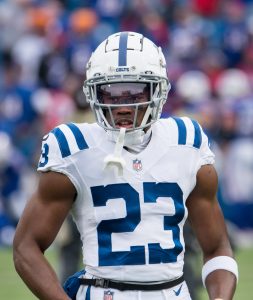 Serving as the Colts’ top cornerback for most of his seven-year Indianapolis tenure, Moore did score a nice extension (four years, $33.3MM) when first eligible. But the market is stuck. Moore lobbied the Colts for a new deal in 2022, following a Pro Bowl season, but they did not budge. Taking the baton from Harris as the game’s best at this increasingly regular role, Moore is poised to hit free agency after a bounce-back year.
Serving as the Colts’ top cornerback for most of his seven-year Indianapolis tenure, Moore did score a nice extension (four years, $33.3MM) when first eligible. But the market is stuck. Moore lobbied the Colts for a new deal in 2022, following a Pro Bowl season, but they did not budge. Taking the baton from Harris as the game’s best at this increasingly regular role, Moore is poised to hit free agency after a bounce-back year.
Following an injury-plagued 2022, Moore graded as PFF’s No. 18 corner. DVOA slotted the Colts 25th against outside receivers but third in slot coverage. With offenses obviously sending WR1s and WR2s into the slot regularly, this position’s glacial market surprises.
Jonathan Jones scored a two-year, $19MM ($13MM guaranteed) deal ahead of his age-29 season last year. Though, the Patriots had used the veteran slot more on the outside as of late. At 5-9, Moore has been a slot stopper primarily. Taron Johnson is tied to an $8MM average Bills salary. With Moore’s Colts pact nearly off the books, Johnson’s AAV tops the market for pure slots. Older corners are frequently discounted, due to the position’s volatility. But with franchise tags coming in at this position for the first time since 2017, a team deciding to bet on Moore’s pedigree with a medium-term deal would make some sense.
Best fits: Colts, Cowboys, Texans
39. Chidobe Awuzie, CB. Age in Week 1: 29
With teams protecting the top second-contract-seeking cornerbacks via tags, those who just played out their second deals become a bit more appealing. Awuzie joins Kendall Fuller, Kenny Moore and Adoree’ Jackson in this group of late-20-somethings. While wide receivers regularly cash in on third contracts, the players tasked with stopping them do not do as well in their late 20s and early 30s. Midlevel pacts await this group, but the new cap number will naturally adjust where that classifier settles in 2024.
After Awuzie served as a vital presence in Cincinnati during its Super Bowl LVI run, the Bengals saw this contract deliver diminishing returns over the following two years. A Halloween 2022 ACL tear threw Awuzie off track, and after he returned in time for Week 1, Lou Anarumo benched the former second-rounder around midseason. But the 6-foot defender received a second chance down the stretch and fared better. Awuzie played at least 97% of the Bengals’ defensive snaps in five of six games from Thanksgiving to New Year’s Day.
PFF rated Awuzie 14th in 2021 and 33rd prior to his ACL tear. The Colorado alum will be nearly two years removed from the injury next season. While the Bengals drafted two outside CBs early in the past two drafts (Cam Taylor-Britt, DJ Turner), Awuzie should generate interest elsewhere. A lot of teams need No. 2 corners.
Best fits: Seahawks, Titans, Broncos
40. Julian Blackmon, S. Age in Week 1: 26
The Colts could lose two secondary bastions next week. While Blackmon has not been in Indianapolis as long as Kenny Moore, he has been the unit’s other mainstay as the team — via trades and gambling suspensions — changed up (for the worse) at outside cornerback last year. Blackmon helped Gus Bradley’s secondary during this trying season, delivering as a playmaker. The former second-round pick intercepted four passes, deflected eight more and recovered two fumbles in a solid contract year.
Bradley used the ex-college CB all over the formation, and the Colts benefited. PFF has never been too high on the Utah product; last year’s No. 38 placement represents his high-water mark. He has started 46 career games and has operated near the line of scrimmage and as a deep safety frequently. Blackmon is now two years removed from the Achilles tear that ended his second season, giving teams some additional incentive to enter this market. With Antoine Winfield Jr. and Kyle Dugger out of the mix, the next wave of safeties become more appealing. Blackmon might not top that group, but he should be part of it.
Best fits: Giants, Broncos, Colts
41. Damien Lewis. Age Week 1: 27
All the guards, as Kurtis Blow once said. Inconsistency infected the Seahawks’ offensive line in recent years. Russell Wilson made a point to urge team brass to better staff the unit in 2021, and after Gabe Jackson became a stopgap solution, the 2022 Seattle edition became the third team since the 1970 merger to start two rookie tackles. The 2023 unit featured some personnel slip-ups, with Jackson’s replacement — Phil Haynes — and center Evan Brown struggling. Haynes and right tackle Abraham Lucas missed extensive time due to injury as well. Amid all this, the Seahawks could rely on Lewis, a 2020 third-round find.
Lewis has experienced his own bouts of inconsistency, but he has been durable — missing more than one game in just one of his four seasons — and effective amid uncertainty up front. The 332-pound mauler graded fourth in ESPN’s run block win rate metric in 2022, helping Ken Walker to a nice rookie season and aiding a team expected to be regrouping post-Wilson into the playoffs.
Lewis’ PFF ratings yo-yoed, and it is likely he will be viewed as a second-tier guard on this year’s crowded market. But the combination of durability, experience and age will help make the LSU alum appeal to teams not ready to wade into this market’s deepest waters.
Bets fits: Seahawks, Saints, Buccaneers
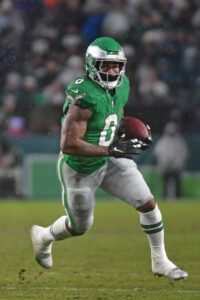 42. D’Andre Swift, RB. Age in Week 1: 25
42. D’Andre Swift, RB. Age in Week 1: 25
While Miles Sanders bombed after riding the Eagles’ elite offensive line into last year’s top free agent running back payday, Swift has shown a higher ceiling and displayed different parts of his skillset in two cities. More of a dual threat in Detroit, Swift flashed but battled nagging injuries. The Lions reduced his touches in 2022, as Jamaal Williams became the lead back. In Philly, Swift removed doubt about the RB1 gig, seizing it from Kenneth Gainwell after Week 1. After Swift’s first 1,000-yard rushing season and first Pro Bowl, teams should be interested. Though, again, even this loaded RB class will have a tough time due to market conditions.
Swift’s age will prove beneficial during this crucial point for his earning power. A year younger than Josh Jacobs, the ex-Lions second-rounder has logged 688 fewer carries (593). Swift is four years younger than Austin Ekeler and five years Derrick Henry’s junior. No, Swift is not as good as any of these backs in their prime. He griped about his role in Detroit, which upgraded via the Jahmyr Gibbs pick. But being 25 and fairly low on wear and tear should drive more interest than perhaps the ex-second-rounder’s resume would warrant.
Putting a 1,000-yard season in a career that has featured two top-10 placements in yards per catch among RBs (2020, ’22), Swift still could offer the right combination of production and usage. Most backs will join Swift in vying for teams’ attention as they consider Day 2 or Day 3 draft investments at the position, but the 2024 rookie crop is not viewed as the same caliber of group compared to the Gibbs- and Bijan Robinson-fronted 2023 class. That stands to help the vets stationed in this upcoming quagmire.
Best fits: Giants, Bengals, Commanders
43. Michael Danna, Edge. Age in Week 1: 26
While Leonard Floyd, Yannick Ngakoue, Frank Clark and Jadeveon Clowney (per usual) settled for one-year deals on the edge market last year, less flashy options Arden Key and Samson Ebukam scored three-year accords early in free agency. Danna’s numbers resemble Key and Ebukam’s pre-2023 work, and neither of those players were docked for playing alongside Nick Bosa and/or Aaron Donald. Danna benefiting from Chris Jones may not be a primary concern as teams look for complementary rush options this month.
The Chiefs partook in last year’s midlevel edge market, giving Charles Omenihu a two-year, $16MM deal despite an imminent domestic violence-driven suspension. But Danna started opposite George Karlaftis all season. A former fifth-round pick, Danna spent time both at defensive end and inside, quietly producing. Danna delivered 11.5 sacks over the past two seasons, adding two forced fumbles during the 2021 and ’22 slates.
Ebukam signed a three-year, $24MM Colts deal despite never totaling more than five sacks in a season; he posted 9.5 last year in Indy. Danna does not profile as a player in need of a “prove it” pact due to his consistency over the past two seasons, but interested teams should be looking for supplementary rushers as opposed to an anchor.
Best fits: 49ers, Saints, Bears
44. Tony Pollard, RB. Age in Week 1: 27
Of the three running backs franchise-tagged last year, Pollard incurred the most value damage. Displaying a dynamic skillset alongside Ezekiel Elliott, the 2022 Pro Bowler would have collected more than Miles Sanders’ $13MM guaranteed at signing. Unlike Saquon Barkley and Josh Jacobs, Pollard did not have a first-round contract on which to fall back. Barkley made more than $31MM on his rookie deal; Jacobs collected $11MM-plus, Pollard played out a four-year, $3.2MM pact. Granted, the $10.1MM is nothing to slouch at. But the current RB market being what it is made Pollard one of the players the tag has punished most in this era.
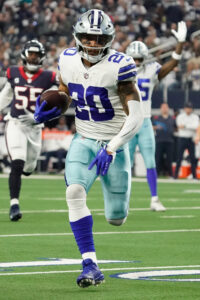 A year later, it is harder to peg the former fourth-rounder’s value. Fantasy GMs regularly saw 0s in Pollard’s TD columns last season, as Dallas’ effort to make the former catch-and-run dynamo an every-down back produced modest results. Amassing 1,378 scrimmage yards, 12 touchdowns and a 9.5-yard average per catch in 2022, Pollard ranked third in Next Gen Stats’ rushing yards over expected metric (226). Given 75 more touches last season, Pollard produced fewer scrimmage yards (1,316) and saw his yards-per-carry number crater from 5.2 to 4.0 despite Dallas rolling out a three-All-Pro O-line. But Pollard’s career carry total (762) trails Barkley by more than 400 and Jacobs by more than 500. A market will emerge, though it probably will not match what a 2023 free agency would have brought.
A year later, it is harder to peg the former fourth-rounder’s value. Fantasy GMs regularly saw 0s in Pollard’s TD columns last season, as Dallas’ effort to make the former catch-and-run dynamo an every-down back produced modest results. Amassing 1,378 scrimmage yards, 12 touchdowns and a 9.5-yard average per catch in 2022, Pollard ranked third in Next Gen Stats’ rushing yards over expected metric (226). Given 75 more touches last season, Pollard produced fewer scrimmage yards (1,316) and saw his yards-per-carry number crater from 5.2 to 4.0 despite Dallas rolling out a three-All-Pro O-line. But Pollard’s career carry total (762) trails Barkley by more than 400 and Jacobs by more than 500. A market will emerge, though it probably will not match what a 2023 free agency would have brought.
It is also worth wondering if teams will take Pollard’s broken leg and high ankle sprain from the 2022 divisional round into account. Pollard played 18 games last season, and it stands to reason he will be healthier being a year removed from surgery. A gig as rich man’s pass-down back would suit Pollard best, and while that an important modern-era skill, valuing it will be tougher due to the volume of RBs on this year’s market — one that includes Austin Ekeler, who is two years older than Pollard.
Alvin Kamara and Aaron Jones are paid near-top-market money for their aerial skillsets, but Pollard is not a threat to score a deal in the $12MM-AAV range. A team could be positioned to land a bargain in getting Pollard coming off an underwhelming season, but a midlevel market floor should still be expected for a player who has made a significant difference in Dallas’ upper-crust offenses from 2021-23.
Best fits: Commanders, Cowboys, Giants
45. Leonard Floyd, Edge. Age in Week 1: 32
Floyd was among the several late-20s or early-30s edge rushers who needed to wait out a cold market last year. His May Bills agreement broke the ice, with the perennial AFC East champs landing the Rams cap casualty for just $7MM. Had the Bills not added Von Miller’s ex-Rams sidekick as insurance, it is unlikely their late-season charge to win a fourth straight division crown would have been enough. A second round of ACL rehab sapped Miller’s form, putting the onus on Floyd, who delivered throughout. The former top-10 pick should not need to settle for flier money, even at his age.
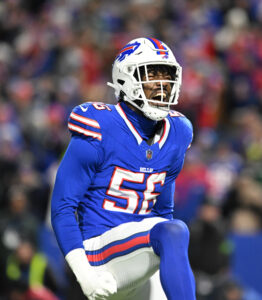 Once run out of Chicago for failing to deliver on his draft status, Floyd has proven to be one of the 2020s’ steadiest edge players. The former top prospect has finished with between nine and 10.5 sacks in each of the past four seasons; Floyd’s QB hit totals (19, 18, 22, 19) in that span underscore his reliability. Last year showed Floyd was not merely an Aaron Donald beneficiary, and he rewarded the Bills, who received zero sacks from Miller once he came off the PUP list.
Once run out of Chicago for failing to deliver on his draft status, Floyd has proven to be one of the 2020s’ steadiest edge players. The former top prospect has finished with between nine and 10.5 sacks in each of the past four seasons; Floyd’s QB hit totals (19, 18, 22, 19) in that span underscore his reliability. Last year showed Floyd was not merely an Aaron Donald beneficiary, and he rewarded the Bills, who received zero sacks from Miller once he came off the PUP list.
There have been 36 instances of 10-plus-sack seasons from players 32 or older over the past 20 years. When the parameters are widened to eight sacks, 65 seasons qualify. Floyd’s consistency will be worth paying mid-market money for. He profiles as a clear candidate to be a contending team’s overqualified No. 2 edge rusher or a borderline No. 1 for a team with young rushers, his Buffalo role. The Bills would miss the eight-year vet if he departs, given Miller’s uncertain future.
Best fits: Bills, Ravens, Vikings
46. Darnell Mooney, WR. Age in Week 1: 26
Based on where Mooney’s numbers have gone since that 1,000-yard 2021 season, inclusion here is unwarranted. We have a two-time rushing champion and a two-time TD kingpin off this list, but a player with back-to-back sub-500-yard years appears. While Derrick Henry and Austin Ekeler are in a crowded market, the WR pool losing Evans, Higgins and Pittman may make a player like Mooney more than a DJ Chark– or Devin Funchess-like flier. And those inconsistent players still scored nice one-year sums in worse cap environments.
Mooney joined Jaylon Johnson and Cole Kmet as players from Ryan Pace’s 2020 draft class on the Bears’ extension radar, but it looks like the former fifth-round speedster will be the odd man out. Chicago wanting to upgrade for Caleb Williams’ WR2 spot makes sense. After his 1,055-yard season in Matt Nagy’s finale, Mooney did not acclimate in Luke Getsy’s offense, totaling 907 yards from 2022-23. But the 5-foot-9 Tulane alum’s 4.38-second 40-yard dash should still entice some teams — even if it is unrealistic to hand out a four-year deal with a sizable guarantee. Could a two-year pact be in play for a player who will not turn 27 until October?
It is not like the top wideout available (Calvin Ridley) offers much more security, and No. 2 in this year’s FA contingent (Marquise Brown) brings a Mooney-like frame and a somewhat similar career arc. The teams who do not want to spend big for Ridley or Brown or even Gabe Davis can look here. Though, that club will need to be confident in its pass-game infrastructure. Otherwise, anything more than a one-year deal is a mistake. Matt Nagy being in Kansas City would make for a natural get-right spot, though the Chiefs — another Super Bowl win aside — will likely have multiple solutions in mind after one of the strangest receiver seasons a Super Bowl champion has put together. They were eyeing Mike Evans, providing an indication of big plans here.
Best fits: Chiefs, Titans, Panthers
47. Adoree’ Jackson, CB. Age in Week 1: 28
Quickly morphing into a disappointing Giants season, last year brought disputes between Don Martindale and Brian Daboll and accusations of the brash defensive coordinator going rogue. Jackson became caught up in this, being asked to play two positions regularly and being stationed on an island as Martindale cranked up blitzes — sometimes against the head coach’s wishes. Jackson’s performance suffered, but it is important to remember the first-rounder’s showings over the first two years of his Giants contract.
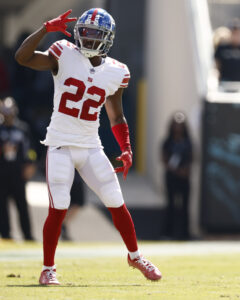 After struggling to stay healthy in Tennessee, Jackson did not need a “prove it” deal despite 2021’s cap reduction. The USC alum played well over the first two seasons of his three-year, $39MM contract. PFF rated the 5-foot-11 cover man as a top-20 corner in 2021 and ’22. Jackson allowed only a 69.0 passer rating as the closest defender in 2021, and after the mid-offseason James Bradberry cut turned Jackson into the Giants’ No. 1 option in Martindale’s first year, he fared well again. Coming off an MCL sprain, Jackson led the way in the Giants containing Justin Jefferson in their wild-card upset.
After struggling to stay healthy in Tennessee, Jackson did not need a “prove it” deal despite 2021’s cap reduction. The USC alum played well over the first two seasons of his three-year, $39MM contract. PFF rated the 5-foot-11 cover man as a top-20 corner in 2021 and ’22. Jackson allowed only a 69.0 passer rating as the closest defender in 2021, and after the mid-offseason James Bradberry cut turned Jackson into the Giants’ No. 1 option in Martindale’s first year, he fared well again. Coming off an MCL sprain, Jackson led the way in the Giants containing Justin Jefferson in their wild-card upset.
Last season: not as good. The Giants asked Jackson to shift to the slot to accommodate sixth-round rookie Tre Hawkins. Once Martindale benched the Day 3 rookie early in the season, Jackson was back in his old job after weeks of slot training. PFF rated Jackson outside the top 110 at corner. This profile would normally point to a rebound deal, but there might be too many teams with CB needs — and too few proven cogs — for Jackson to need to settle there.
Best fits: Lions, Raiders, Broncos
48. Sheldon Rankins, IDL. Age in Week 1: 30
Inside pass rushers remain among the NFL’s top commodities. Rankins played on a one-year deal last season in Houston but enjoyed his best pass-rushing season in five years, totaling six sacks, 10 quarterback hits and 16 pressures. Rankins drew interest from the Jets as well last year, leading to a $7MM signing bonus on a $9.75MM deal. After showing his pass-rushing burst remains, the former Saints first-rounder should outdo this soon.
The compact DT helped the Will Anderson–Jonathan Greenard tandem shine by ranking seventh in pass rush win rate at this position. A three-sack showing against the Bengals, probably the Texans’ most impressive regular-season win, drove this bounce-back season. Rankins’ 59% snap rate was also his highest since the 2018 season, when the Louisville alum recorded eight sacks. Beyond Chris Jones and Christian Wilkins, the top DTs in this class are nose tackles.
Rankins profiles as an affordable three technique who could score a medium-term deal with a contender, though ideally one that uses a 4-3 scheme. If the Texans do not go big with Jones or Wilkins, Rankins represents a nice consolation prize. Nick Caserio has authorized a few two-year midlevel deals in his time.
Best fits: Texans, Browns, Jaguars
49. John Simpson, G. Age in Week 1: 27
To round out this guard group, looking to the Ravens has been a decent team to study when it comes to identifying an interior O-lineman who will draw free agency interest. Baltimore has long prioritized compensatory picks, with inside blockers being among those the team has been fine letting go in free agency. Dating back to Kelechi Osemele, the Ravens have preferred to draft and develop here or add on a medium-term deal — in the case of Kevin Zeitler. Baltimore has lost Ryan Jensen, Bradley Bozeman and Ben Powers along its interior in recent years. Powers fetched last year’s top guard payout (four years, $52MM, $27MM guaranteed at signing), doing so after competing for a starting job during the Ravens’ 2022 training camp. Simpson probably will not command that price, but his profile is somewhat similar.
A full-season Raiders starter in 2021, Simpson ended up on the waiver wire in December 2022. The Ravens added the Clemson alum to their practice squad soon after and gave him their starting LG job, replacing Powers, out of training camp last year. Showing impressive power in the Ravens’ run game, Simpson played a key role on one of the NFL’s best offenses.
PFF has never thought too much of the 330-pound mauler, not ranking him inside the top 40 at guard in a season. But this Ravens pattern has persisted up front. With Kevin Dotson and Ezra Cleveland off the market via re-signings, guards who do reach free agency will stand to generate more interest. While a potential “prove it” deal candidate, Simpson following Powers’ path and landing a multiyear pact would not be too hard to foresee.
Best fits: Lions, Ravens, Seahawks
50. Tyler Boyd, WR. Age in Week 1: 29
It is possible the market dries up for Boyd, but there might be just enough receivers exiting this year’s free agency mix for the longtime Bengals slot target to generate extensive interest. Boyd played out a four-year, $43MM Bengals extension and is almost definitely headed out of Cincinnati due to the team tagging Tee Higgins and having a Ja’Marr Chase extension — likely in 2025 — on the radar. Boyd did not enjoy a great contract year, but a Joe Burrow-related mulligan would be understandable given the circumstances. The former second-round pick has been a big part of Cincy’s passing game dating back to Andy Dalton‘s prime but should have some productive years remaining.
Dropping to clear WR3 status once Chase arrived in 2021, Boyd remained a dependable auxiliary piece as the Bengals began their rapid ascent into an AFC power. Stringing together back-to-back 1,000-yard seasons in the late 2010s, Boyd eclipsed 800 yards twice (2020, ’21) on his extension. The big-bodied slot (6-foot-2, 203 pounds) only totaled 667 in 2023, but much of that time was spent with an injured Burrow or with Jake Browning at the controls. The eight-year veteran makes sense on a contender or with a team breaking in a young quarterback, helping expand his options.
Best fits: Bills, Titans, Jets